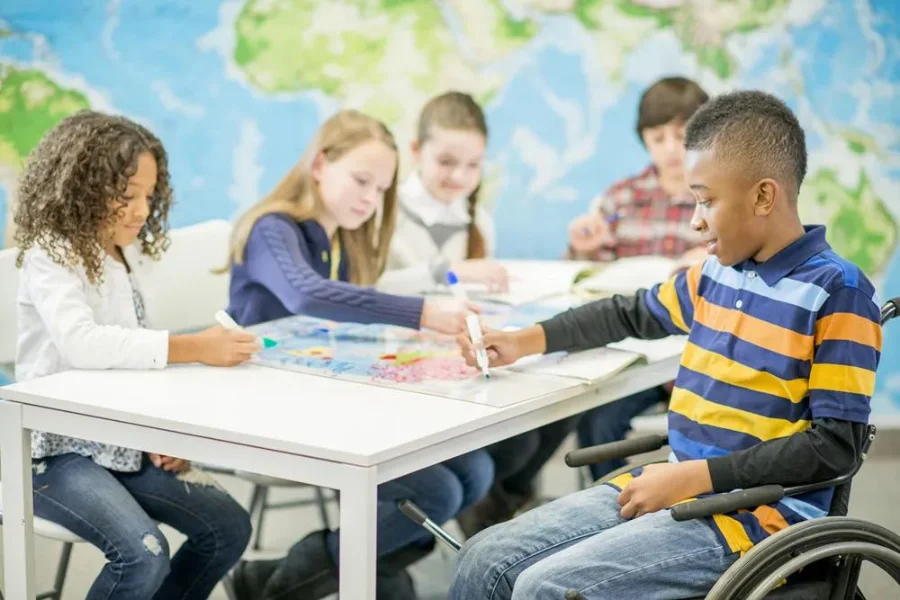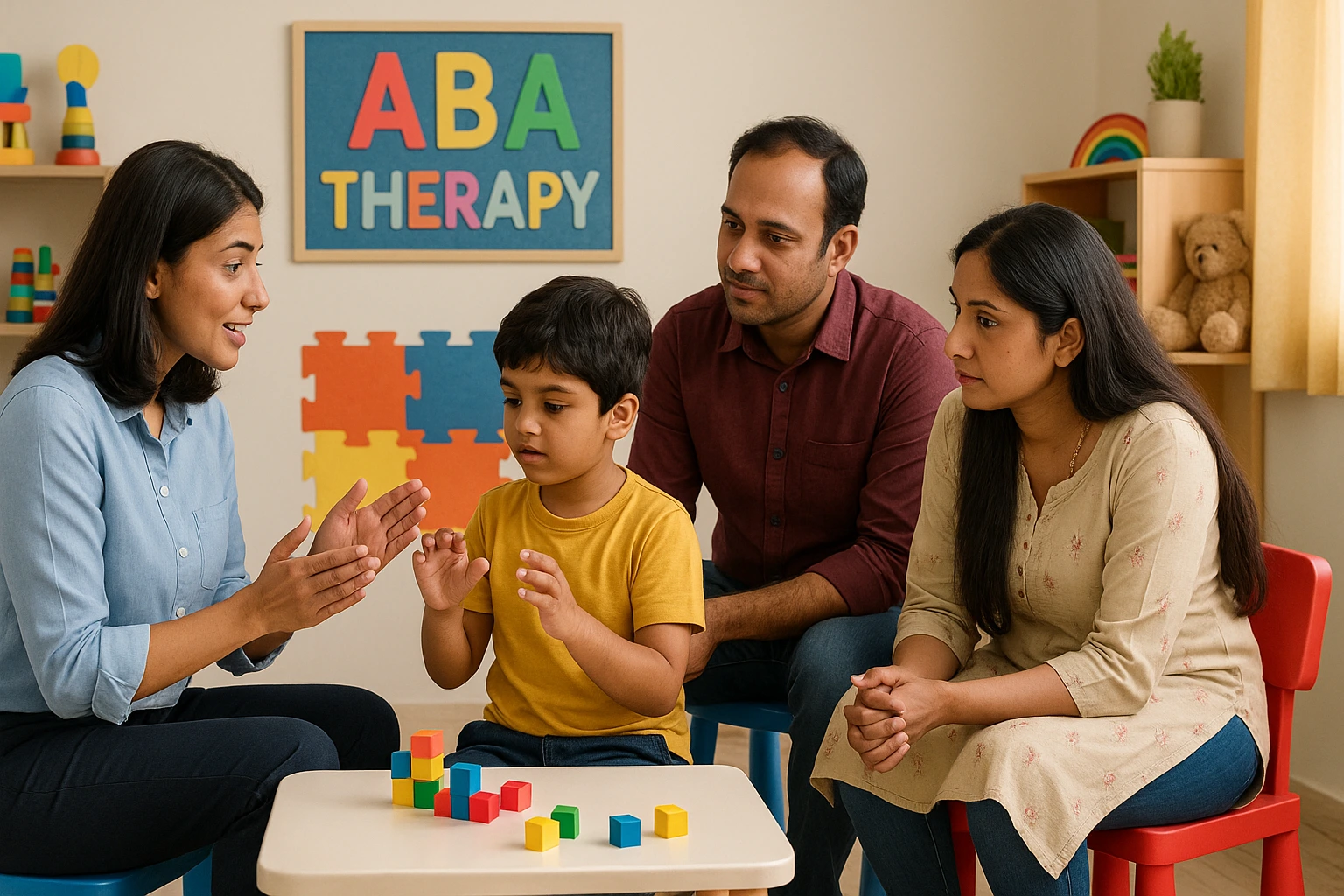Why Special Education for Autism is Essential for Every Child with ASD?
Why Special Education for Autism is Essential for Every Child with ASD?
Autism, a neurodevelopmental disorder has a hard-wearing influence on the overall development of any individual, restricting their ability to reach their true potential. To help ASD Individuals handle their challenges effectively, providing them academic aid and assistance as per the Special Education is a must.
Since no two ASD individuals have the same set of needs and challenges, it becomes imperative to provide them with tailored support and teaching methods that promote communication, social interaction and help them function independently
Special Education trains candidates to design and construct a healthy and conducive learning environment that relates well to the sensory sensitivities of ASD individuals enabling them to feel secure and focus well in a mainstream classroom.
Special Education is a precondition that fosters the meaningful progress of ASD individuals helping them achieve their learning objectives enabling them to lead wholesome lives with respect and confidence.
Table of Content
What Makes Special Education Different for Children with Autism?
Children with Autism are talented individuals with high levels of intelligence. Their sensitivities towards loud noisy environments and neural issues affect they way they process information that leads to unpleasant behaviours and emotional burnouts. Stigmatising attitudes of the community and bias towards autistic individuals make their happy existence a strained reality.
Since every autistic individual is a unique personality special education for autism aims to provide them personalised strategies and structured techniques helping them manage their communication, behavioural and learning challenges.
Here’s how Special Education for Autism differs and why it is so effective:
Customised Strategies supporting communication.
Children with Autism face grave challenges when it comes to processing sensory information and communication. Special Education for Autism comprises tailored strategies that can enhance the communication and interaction skills of ASD individuals.
- Structured Visual Routines help children understand and retain information for a longer time.
- Specialised Speech therapy is implemented to promote verbal and non-verbal attributes.
Behavioural Support and Intervention
Managing behavior is a major focus in Special Education for Autism. The goal is to analyse what triggers the behaviour and provide solution to target these root causes.
- Applied Behavior Analysis (ABA) is the prime fundamental strategy used to attain positive attitudes and reduce emotional burnouts.
- Structured routines foster security reducing depressions.
- Rewarding techniques and acknowledging positive behaviours helps to motivate children to strive better.
Customised Learning Strategies
Every child whether autistic or not is unique with specific learning needs. Owing to this characteristic Special Education for Autism aims to incorporate several methods based on varied sensory modes which align with the child’s strengths interests, and pace.
- Individualised teaching enables the child to remain focused ensuring proper understanding of the topics.
- Sensory-friendly methods using materials that promote learning for individuals with sensory issues.
- Chunking process is used that breaks complex processes into small steps enabling children to master small tasks and promotes learning of complex topics.
Social Skill Development
Communication and Interpersonal skills are essential characteristics that aid in building the child’s personality. Special Education trains children to understand social verbal and non-verbal cues, developing steady eye-contact and being a productive part of any group activities.
- Peer friendships and stories help children understand complex situations better in a concise uncomplicated manner.
- Role-playing activities helps to make situations relatable to children allowing them to connect it to their lives.
- Group work helps to foster a spirit of oneness and understanding.
Collaborative Team Support
Special Education for Autism thrives on a strong network-based approach. The important stakeholders in the child’s journey share their essential inputs about the child to provide them consistent support and personal guidance.
- Regular meetups with parents and other professionals to keep a track of the child’s progress.
- Exclusive techniques that are Home-based are shared with parents to create an equally enriching learning environment at home.
Tailored strategies lay the perfect foundation that helps to bridge any academic gaps and helps to track the real areas of concern and offer the precise support needed by the child.
Special Education endeavours to offer the child a systematic and sensorial comfortable learning environment that tackles the core challenges faced by the learner.
For downloading the brochure of SEN Course, Click Here!
Call or Whatsapp on +919321024137 / +919869546913, for more details of SEN Course!

Individualized Education Programs (IEPs): a Roadmap to Success
IEP or Individualised Educational Plans are the fundamental roadmaps to the child’s all-round developmental encompassing all the domains including physical, social, cognitive and interpersonal behaviour. IEP is based on the principle that every child is unique and especially ASD individuals need a structured agenda that highlights their objectives based on their competencies easy to achieve and at a pace that suits the learner.
IEPs act as a bridge that fills in any academic gaps by providing customised support , differentiated instruction and promotes high levels of functionality for them with minimal assistance encouraging them to handle their challenges confidently.
Here’s how IEPs support personalized learning goals in Special Education for Autism:
Assessment-Based Goal Setting
The formation of IEP commences by observation of the child to assess his distinguishing attributes, his strengths, and his current competency levels in various arenas such as academics, behaviour, social skills, and interpersonal communication. Once the current capabilities are determined practical achievable goals are set for the child which are age and capacity appropriate ensuring attainment of goals and objectives with confidence and convenience.
Individualised teaching methods
As the IEP highlights the strengths and weaknesses of the child, te learning style of the child becomes evident. Therefore, educators can base their teaching methods as per the child’s learning styles. Special Education for Autism trains aspirants in using specially designed visual aids that help autistic individuals understand their routines and schedules clearly helping them stay calm and focus better suiting their cognitive needs as well.
Regular Progress Tracking
- IEPs have a designated format for periodic reviews and assessment for the child that helps to assess whether the current teaching methods are helping the child progress. Important data is collected and a portfolio is maintained on a regular basis.
- Regular updating helps to track whether the child has achieved his milestones and whether learning goals are being attained.
Strong Positive Teamwork.
IEPs are a collaborative team efforts with inputs from educators, parents, teachers and school management. This collaboration highlights the learning objectives of the child and ensures that all the stakeholders of the child’s academic journey are on the same page ensuring consistency, transparency and helping the child get the best of all supports.
Support Services Integration
Occupational therapy, Speech Therapy and behavioural support are the underlying aided tools that are a must for Autistic Individuals. The IEP has a special section which makes a mention of these tools for the child’s holistic progress. In Special Education for Autism, these services are not optional extras—they are essential components of learning success.
Focus on Life Skills
Life-Skills are extremely important in today’s world where decision making, time management and communication are the foundation for a bright future. Within Special Education for Autism, these real-world skills are vital to long-term development.
IEPs make Special Education for Autism truly personalized. They not only focus on academic content, but also emphasise upon carefully customized strategies that meet emotional, social, and functional needs. By using IEPs, schools provide a meaningful, structured path toward success for every child with ASD.
For downloading the brochure of SEN Course, Click Here!
Call or Whatsapp on +919321024137 / +919869546913, for more details of SEN Course!

Source: wockhardthospitals
Benefits of Early Intervention in Special Education
Early intervention offers a good approach – it provides support to children with Autism Spectrum Disorder (ASD) when they develop. Special Education for Autism has strategies that improve how children communicate, act along with learn. The sooner a child gets this support, the better and more permanent the results are.
Early intervention in Special Education for Autism has several benefits:
Builds Strong Communication Skills
Children with ASD face problem when they have to communicate with others. Early intervention in Special Education for Autism uses speech therapy and visual aids – these help children grasp plus use language. When children start early, these ways of communicating become part of their daily life, so they connect with other people more easily.
Enhances Social Development
Social interaction is difficult for most children with ASD. Special Education for Autism provides early introduction to structured social play, peer interaction, and directed group activities. These allow children to learn about making friends, sharing, and grasping feelings which are important skills for everyday life.
Encourages Cognitive Growth
Early intervention takes a step into a child’s possibilities when the brain is least resistant to changes. Special Education for Autism consists of customized lesson plans that build attention span, reasoning capacities, and readiness to learn. Intensive teaching trains children to enhance thinking habits beneficial for lifelong learning.
Reduces Behavioural Issues
Different behavior disorders in children with ASD originate from frustration or misinterpretation. Intervening early through Special Education for Autism can eliminate these behaviors by learning coping skills, self-regulation, and other means of expressing feelings. With this, the child can adjust more smoothly in both school and home settings.
Supports Family Involvement
Parents and carers time and again go through training as part of early intervention. Special Education for Autism equips families with tools to support their child mange life outside the classroom. When home and school stay on the same page, kids make rapid progress and realise their needs and strengths better.
Enhances Long term Development
ASD Individuals who get the desired academic and personal assistance through Special Education are better prepared at functioning independently in a mainstream classroom and forming meaningful bonds that vital for living a life of success and respect.
Early intervention plays an important role in Special Education for Autism. By emphasising upon critical areas like communication, making friends, thinking, and behaving timely support lays a strong foundation for the child’s future.
For downloading the brochure of SEN Course, Click Here!
Call or Whatsapp on +919321024137 / +919869546913, for more details of SEN Course!

Role of Trained Educators and Therapists in ASD Education
In the context of Special Education relative to Autism, there is a diversity of learning that trained educators and therapists need to fulfill the needs of students with autism. The educators and therapists apply training and specialized techniques to support the students in navigating and overcoming daily learning challenges. The Diploma in Special Education Needs offered through Vidhyanidhi Education Society (Govt. Regd.) qualifies people to be specialists in this area so that they can effectively engage and deliver inclusive learning.
Here’s how trained educators and therapists contribute to Special Education for Autism:
Individualized Learning Strategies
- ASD Individuals process information in a unique manner and therefore their learning styles will not be same as any average learner. Trained educators possess the desired understanding of the diverse needs of students and since they have adequate exposure to real classroom
- scenario, they can provide customised learning strategies based on the child’s strengths.
- SPED program has a major module based on how to design IEP’s that help ASD individuals acquire information in a manner that aligns with the learning styles of the students.
Behavior Management
Children with ASD often have behavioral difficulties. Special Education for Autism trained educators and therapists are taught evidence based practices including ABA and Positive Behavior Support (PBS). These ways to calm your child stop out of control behaviours and foster positive habits in children. The Diploma in Special Education Needs includes practical modules on behavior interventions that allow specialists to manage classroom behaviour effectively.
Building Communication Skills
Many children with autism have problems with verbal and non-verbal communication. As part of the Diploma in Special Education Needs, teachers and therapists are trained on visual supports, assistive technology and alternative communication devices. Once the child finds it easy to express himself it helps to improve their inter-personal skills fostering strong and meaningful bonds.
Encouraging Social and Emotional Growth
Principal objective of Special Education for Autism is to help children develop healthy social and emotional behaviors. Trained professionals focus on providing structured opportunities for social interaction. They use group activities, role play, and peer modelling to help children relate better to others.
Family Collaboration
Therapists and educators play a vital role in supporting families. In the Diploma in Special Education Needs program, they learn how to communicate well with parents and interact with them to facilitate learning and development process. This reinforces consistency between home and school.
Educators and therapists trained in Special Education for Autism are not just teachers—they are change-makers. With the right training, such as that offered through the Diploma in Special Education Needs by Vidhyanidhi Education Society (Govt. Regd.), they become specialists equipped to meet the unique challenges of autism education with care, skill, and patience.
Transform young lives—join Vidhyanidhi’s SEN Course and make a real impact!
For downloading the brochure of SEN Course, Click Here!
Call or Whatsapp on +919321024137 / +919869546913, for more details of SEN Course!
FAQs
At what Age should Special Education Support Begin for a Child with ASD?
Services can start as early as age 2–3 when child first exhibit signs of ASD, which is a critical time for developing essential skills
Can Children with Autism Attend Mainstream Schools?
Yes, children with Autism when provided with appropriate academic aid and behavioural support can be a part of mainstream schools.





